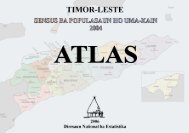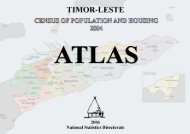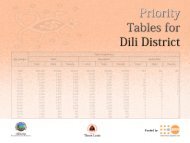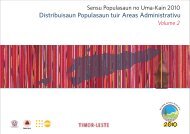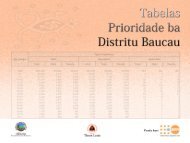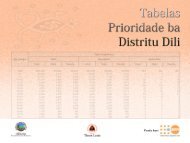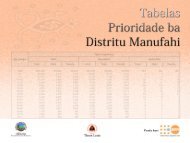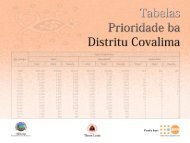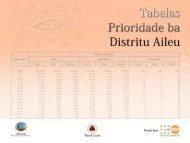Demographic and Health Survey 2009-10 - Timor-Leste Ministry of ...
Demographic and Health Survey 2009-10 - Timor-Leste Ministry of ...
Demographic and Health Survey 2009-10 - Timor-Leste Ministry of ...
Create successful ePaper yourself
Turn your PDF publications into a flip-book with our unique Google optimized e-Paper software.
Table 14.3.2 Comprehensive knowledge about AIDS: Men<br />
Percentage <strong>of</strong> men age 15-49 who say that a healthy-looking person can have the AIDS virus <strong>and</strong> who, in response to prompted questions, correctly reject<br />
local misconceptions about AIDS transmission or prevention, <strong>and</strong> the percentage with a comprehensive knowledge about AIDS, by background characteristics,<br />
<strong>Timor</strong>-<strong>Leste</strong> <strong>2009</strong>-<strong>10</strong><br />
Background<br />
characteristic<br />
A healthylooking<br />
person<br />
can have the<br />
AIDS virus<br />
186 | HIV/AIDS-Related Knowledge, Attitudes, <strong>and</strong> Behavior<br />
Percentage <strong>of</strong> respondents who say that: Percentage who say that<br />
AIDS cannot be<br />
transmitted by<br />
mosquito bites<br />
A person cannot<br />
become infected<br />
by sharing food<br />
with a person<br />
who has AIDS<br />
AIDS cannot be<br />
transmitted by<br />
sharing clothes<br />
with a person<br />
who has AIDS<br />
a healthy looking person<br />
can have the AIDS virus<br />
<strong>and</strong> who reject the two<br />
most common local<br />
misconceptions 1<br />
Percentage with<br />
a comprehensive<br />
knowledge<br />
about AIDS 2<br />
Number <strong>of</strong><br />
men<br />
Age<br />
15-24 45.3 43.0 41.8 44.1 28.4 19.7 1,636<br />
15-19 38.1 38.0 37.8 40.8 23.7 14.7 994<br />
20-24 56.3 50.7 47.8 49.3 35.6 27.4 643<br />
25-29 57.2 48.2 51.5 52.2 33.9 23.7 586<br />
30-39 47.7 43.7 43.6 44.8 30.3 21.7 992<br />
40-49<br />
Marital status<br />
36.3 33.3 34.4 34.9 22.7 16.4 861<br />
Never married 46.7 44.0 43.4 45.6 29.1 20.8 1,865<br />
Ever had sex 63.2 56.7 54.9 57.2 36.3 33.1 540<br />
Never had sex 40.0 38.8 38.7 40.9 26.2 15.8 1,325<br />
Married/living together<br />
Divorced/separated/<br />
45.3 40.3 41.2 42.0 28.0 19.6 2,158<br />
widowed<br />
Residence<br />
23.8 33.4 28.0 29.3 19.4 <strong>10</strong>.5 53<br />
Urban 65.1 58.4 64.7 65.3 41.5 34.2 1,<strong>10</strong>2<br />
Rural<br />
District<br />
38.5 35.8 33.7 35.4 23.6 14.8 2,974<br />
Aileu 43.9 20.4 23.6 23.3 16.9 14.9 181<br />
Ainaro 36.6 35.8 32.1 33.2 30.8 5.7 217<br />
Baucau 60.4 56.3 53.5 54.5 50.3 6.1 415<br />
Bobonaro 41.5 44.8 44.7 45.1 31.1 26.4 357<br />
Covalima 11.5 44.8 49.1 55.4 6.2 5.8 236<br />
Dili 73.3 65.3 73.3 74.4 47.2 40.4 797<br />
Ermera 18.5 12.6 3.4 6.4 2.4 1.9 491<br />
Lautem 36.6 32.2 41.5 43.8 19.4 18.9 308<br />
Liquiçá 42.2 34.5 31.6 34.8 23.5 22.0 252<br />
Manatuto 98.3 90.0 57.2 72.0 56.1 55.5 190<br />
Manufahi 44.2 42.8 44.2 43.8 42.4 42.4 137<br />
Oecussi 41.9 14.0 27.1 15.4 <strong>10</strong>.7 5.4 235<br />
Viqueque<br />
Education<br />
14.5 24.0 24.2 23.4 11.7 9.0 260<br />
No education 14.9 11.9 <strong>10</strong>.4 <strong>10</strong>.4 4.8 2.6 791<br />
Primary 30.4 26.5 25.9 27.6 14.9 9.6 1,046<br />
Secondary 61.4 57.3 58.2 60.0 41.0 28.3 2,009<br />
More than secondary<br />
Wealth quintile<br />
83.2 80.0 82.9 85.5 61.6 55.3 230<br />
Lowest 22.2 22.6 22.8 22.4 13.2 8.6 728<br />
Second 32.6 29.1 27.8 29.9 18.4 9.9 781<br />
Middle 40.0 36.3 34.8 37.2 24.3 16.3 786<br />
Fourth 51.9 46.9 47.3 49.3 30.5 20.9 849<br />
Highest 74.1 67.8 70.4 71.3 50.3 39.7 932<br />
Total 15-49 45.7 41.9 42.0 43.5 28.4 20.0 4,076<br />
1 Two most common local misconceptions: AIDS can be transmitted by mosquito bites <strong>and</strong> by sharing food with a person with HIV<br />
2 Comprehensive knowledge means knowing that consistent use <strong>of</strong> condom during sexual intercourse <strong>and</strong> having just one uninfected faithful partner can<br />
reduce the chance <strong>of</strong> getting the AIDS virus, knowing that a healthy-looking person can have the AIDS virus, <strong>and</strong> rejecting the two most common local<br />
misconceptions about AIDS transmission or prevention.<br />
Tables 14.3.1 <strong>and</strong> 14.3.2 also provide an assessment <strong>of</strong> the level <strong>of</strong> comprehensive knowledge<br />
<strong>of</strong> HIV prevention <strong>and</strong> transmission. Comprehensive knowledge is defined as knowing that both<br />
consistent condom use <strong>and</strong> limiting sexual partners to one uninfected person are HIV prevention<br />
methods; being aware that a healthy-looking person can have HIV; <strong>and</strong> rejecting the two most<br />
common local misconceptions—that HIV can be transmitted by mosquito bites or by sharing food<br />
with someone who has AIDS. According to the <strong>2009</strong>-<strong>10</strong> TLDHS results, 11 percent <strong>of</strong> women <strong>and</strong> 20<br />
percent <strong>of</strong> men age 15-49 in <strong>Timor</strong>-<strong>Leste</strong> have comprehensive knowledge about AIDS.<br />
Tables 14.3.1 <strong>and</strong> 14.3.2 document considerable variation in comprehensive knowledge by<br />
respondents’ background characteristics. Comprehensive knowledge about AIDS decreases with age<br />
among both women <strong>and</strong> men. Comprehensive knowledge is higher among never-married women <strong>and</strong><br />
men than among ever-married women <strong>and</strong> men.



